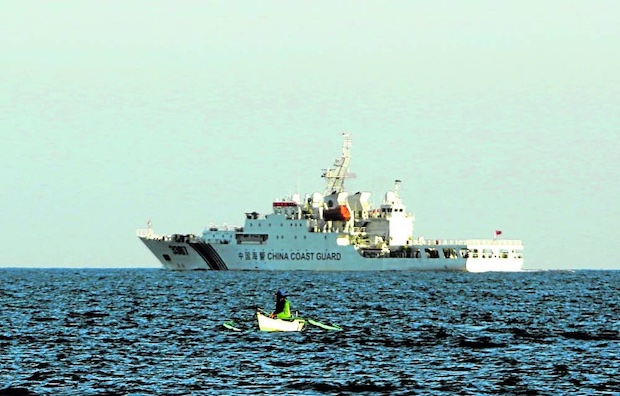Life goes on for local fishers amid China ban

TRADITIONAL FISHING GROUND In this November 2016 photo, a Filipino fisherman catches fish as the China Coast Guard patrols Panatag (Scarborough) Shoal in the West Philippine Sea, a traditional fishing ground for Zambales and Pangasinan fishers. —Richard A. Reyes/Inquirer
MANILA, Philippines — Filipino fisherfolk continue to sail in the West Philippine Sea despite China’s intrusive fishing ban there, a unilateral annual policy which the government and analysts deem to be illegal and baseless while also being generally ignored by local trawlers even in previous years.
Leonardo Cuaresma, president of the Zambales-based New Masinloc Fishermen Association, on Monday said they were unaware that the ban had already begun.
READ: DFA protests China’s fishing ban encroaching West Philippine Sea
Beijing’s fishing moratorium in the South China Sea encroaches most of the West Philippine Sea in outright disregard of Manila’s sovereign rights inside its own exclusive economic zone (EEZ) where it is allowed to explore and manage all the resources as provided by the United Nations Convention on the Law of the Sea.
It already started on May 1, 2024 and is expected to last until September 16, 2024.
READ: Chinese ships block convoy’s mother boat from reaching Scarborough
Fishers sail as usual
“Our pangulongs go sailing [in the West Philippine Sea] everyday [despite the ban],” Cuaresma, told INQUIRER.net in a phone interview in Filipino, referring to an indigenous mother boat.
Cuaresma, who has sailed in the West Philippine Sea for over four decades, also noted that he, along with hundreds of fishermen, already joined the civilian convoy led by five “pangulongs”—which attempted to reach Scarborough (Panatag) Shoal—also this month when Beijing’s moratorium is already in place.
The fishing activities of small bancas and pangulongs during the mission went unimpeded, as witnessed by INQUIRER.net. However, the convoy was blocked to come near the vicinity of Panatag Shoal by 10 China Coast Guard (CCG) vessels in what the Philippine Coast Guard (PCG) branded as an “overkill” response.
The actions of CCG are in line with Beijing’s assertion of sovereignty in almost the entire South China Sea, including most of the West Philippine Sea, even if such a claim has been effectively invalidated by a July 2016 international tribunal ruling which stemmed from a case filed by Manila in 2013.
Miscalculation concerns
Despite CCG’s latest demonstration of authority, a geopolitical analyst noted that Filipino fishermen were able to fish in the West Philippine Sea even in previous years.
“Nevertheless, there are still risks of escalation,” Don McLain Gill, a lecturer at the De La Salle University’s Department of International Studies, said in a message to INQUIRER.net on Monday.
Gill also said “we have to wait and see” as to how the administration of President Ferdinand “Bongbong” Marcos Jr. intends to address the lengthy ban.
“This uncertainty and concern for miscalculation will likely raise pressures for the Marcos Jr. administration,” Gill noted.
“It is likely for Manila to remain cautious and utilize its open channels with Beijing, while simultaneously emphasizing how the illicit and unilateral actions of China continue to derail bilateral ties,” he further said.
Ban met with usual protest
In an expected move, the Department of Foreign Affairs (DFA), through a diplomatic note, on Monday protested the fishing ban, calling it “illegal” under the “final and binding” 2016 Arbitral Award. The DFA would always lodge a protest whenever China announces this yearly moratorium.
For Rommel Jude Ong, a retired Philippine Navy rear admiral and a professor at the Ateneo School of Government, the DFA should have completely disregarded China’s unilateral policy.
“My personal opinion, we should just ignore it,” Ong said in a message to INQUIRER.net on Monday. “By protesting, we acknowledge its existence and inadvertently recognize it even in protest.”
But for security expert Chester Cabalza, all other channels, like filing of a diplomatic protest, should be explored to defy Beijing’s policy and assert Manila’s rights in the West Philippine Sea.
“This [fishing ban] should be defied,” Cabalza, president and founder of Manila-based think tank International Development and Security Cooperation, said in a message to INQUIRER.net on Monday. “We should encourage more of our Filipino fishers to continue their fishing rights in our maritime entitlements.”
Fishers not yielding
Cabalza further said: “If we submit ourselves to their domestic law, it means that we surrender to their will.”
Which, Cuaresma said, the fisherfolk have no plans of doing, as PCG continues to allow the fishermen to sail in the West Philippine Sea.
“As long as our government allows us, we will continue to fish and we will not allow our neighboring countries to bully us and interfere with our livelihood,” Cuaresma said.
“We do not recognize the authority of the Chinese government—there is no fishing ban [in the West Philippine Sea] as far as the fisherfolk are concerned,” the fisherman added.
For comprehensive coverage, in-depth analysis, visit our special page for West Philippine Sea updates. Stay informed with articles, videos, and expert opinions.